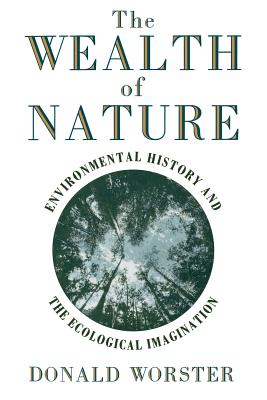

 Oxford University Press, USA
Oxford University Press, USA
Wealth of Nature: Environmental History and the Ecological Imagination


Key Metrics
- Donald Worster
- Oxford University Press, USA
- Paperback
- 9780195092646
- 9.2 X 6.26 X 0.6 inches
- 0.85 pounds
- Social Science > Human Geography
- English
 Secure Transaction
Secure TransactionBook Description
The Wealth of Nature captures the fruit of what Worster calls my own intellectual turning to the land. History, he writes, represents a dialogue between humanity and nature--though it is usually reported as if it were simple dictation. Worster takes as his point of departure the approach expressed early on by Aldo Leopold, who stresses the importance of nature in determining human history; Leopold pointed out that the spread of bluegrass in Kentucky, for instance, created new pastures and fed the rush of American settlers across the Appalachians, which affected the contest between Britain, France, and the U.S. for control of the area. Worster's own work offers an even more subtly textured understanding, noting in this example, for instance, that bluegrass itself was an import from the Old World which supplanted native vegetation--a form of environmental imperialism. He ranges across such areas as agriculture, water development, and other questions, examining them as environmental issues, showing how they have affected--and continue to affect--human settlement. Environmental history, he argues, is not simply the history of rural and wilderness areas; cities clearly have a tremendous impact on the land, on which they depend for their existence. He argues for a comprehensive approach to understanding our past as well as our present in environmental terms.
Nostalgia runs all through this society, Worster writes, fortunately, for it may be our only hope of salvation. These reflective and engaging essays capture the fascination of environmental history--and the beauty of nature lost or endangered--underscoring the importance of intelligent action in the present.
Author Bio
Donald Worster is one of the founders of, and leading figures in, the field of environmental history. He is currently Distinguished Foreign Expert and senior professor in the School of History of Renmin University of China.
Before coming to Beijing, Worster held the position of Hall Distinguished Professor of American History at the University of Kansas from 1989 until his retirement.Worster has been active in environmental history since the early 1970s, in the United States and other parts of the world. In 1971, he completed his Ph.D. at Yale University, where he studied the history of ecology, environmental literature, intellectual history, and the history of the American West. Formerly the president of the American Society for Environmental History, Worster has served on a number of editorial boards, and, for more than two decades, has been founding editor for the Environment and History book series published by Cambridge University Press.
He is an elected member of the Society of American Historians and the American Academy of Arts and Sciences. In 2011 and 2013 he was a Fellow at the Rachel Carson Center for Environment and Society at LMU Munich.Worster’s books include Nature’s Economy: A History of Ecological Ideas; Dust Bowl: The Southern Plains in the 1930s; Rivers of Empire: Water, Aridity, and the Growth of the American West; A River Running West: The Life of John Wesley Powell; and A Passion for Nature: The Life of John Muir; along with several books of collected essays including The Wealth of Nature: Environmental History and the Ecological Imagination.
His current research focuses on two projects: Darwinian and post-Darwinian science and the concept of adaptation as theoretical bases for environmental history, and the twin, competing themes of natural abundance and scarcity in American and modern world history.
Source: The Ohio State University
Videos






Community reviews
Write a ReviewNo Community reviews